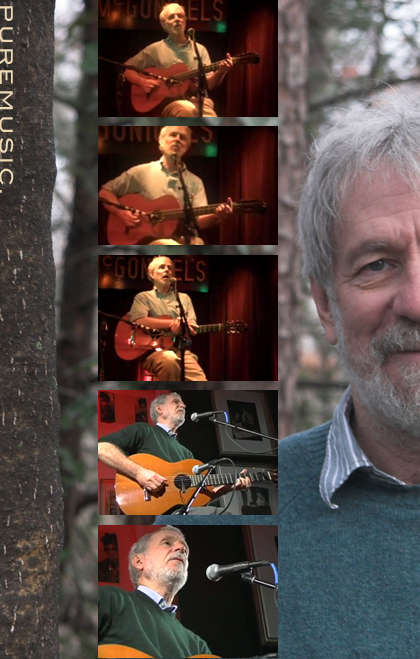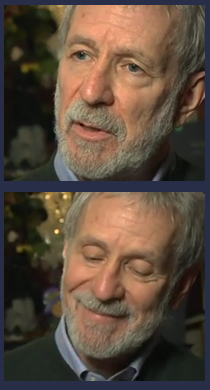
A Conversation with Jesse Winchester (continued)
PM: I'd love to hear anything at all that you'd say about your approach to songwriting, the most casual or the most detailed thing.
JW: I kind of think of it as two different stages. The first one would be the inspiration. And I have really no idea what that is, or how it happens, and I can't control it, and that's the frightening thing for me, is not being able to control it or turn it on or off.
I don't know where ideas come from. I cannot sit down -- I don't read a newspaper and say, "Oh, gee, that would make a nice song." It just doesn't happen that way for me. It just sort of comes out of nowhere.
PM: Right.
JW: And I just have to sort of cross my fingers. But once I have the idea then it becomes more craft, and you can -- you can say, "Well, I'm going to work from 9:00 to 5:00 on this." And you can do that, and make sure that everything scans properly and rhymes properly, and you can maintain a consistent point of view from beginning to end and it coheres.
PM: [laughs]
JW: Yeah, because normally that really is an issue. I can remember writing songs and you get to what you think is the end of it and realize that it started out being a sad song and wound up being a novelty song or something. You lost your point of view. So you have to be careful about that. But as I say, that's all something that you can work at and you don't have to depend upon something that you can't control. So that's the two phases of it for me.
PM: Wow. Thanks for that. Are there songwriters that you still enjoy a lot today that are still writing, whose work you still enjoy?
JW: There's a guy -- I don't even know his name -- I think his name is Castleman, but I'm not sure.
PM: Oh, yeah, yeah, yeah. That's his name. The guy that wrote those Alison Krauss tunes.
JW: He wrote "Let Me Touch You For a While." He wrote "The Lucky One." I think those are the only two I know.
PM: Oh, "The Lucky One," he wrote.
[learn more about Robert Lee Castleman at his site]
JW: But those are so beautiful that I just know he's got to be super talented. So I love him.
PM: I think he's an ex-truck driver, if I'm not mistaken.
JW: Is that right?
PM: Yeah. I've got to check that out. But I think he was a truck driver and sent her songs.
JW: Well, he's a beautiful writer. There are so many great writers. Whoever is writing for -- and I think he helps write them himself -- or he may write them all himself -- is Kenny Chesney.
PM: Oh, now, he cuts a lot of outside songs.
JW: He has superb songwriters writing for him.
PM: Yeah, God bless him, he cuts a lot--
JW: And that song by Alan Jackson, "Drive" I believe is the title of it, and it's about his father teaching him to drive. Just some beautiful songwriting. There's so much great writing going on in Nashville, it hurts. But I'm still kind of hung up on the old guys myself, because I'm an old guy. So I love Chuck Berry -- I just don't think there's a better writer than Chuck Berry.
PM: [laughs] Oh, I second that emotion. I think his lyrics are just unbelievable.
JW: Speaking of "Second That Emotion," Smokey Robinson, and so many -- Harlan Howard and --
PM: Yeah.
JW: There's so many beautiful writers, I just wouldn't know where to stop.
PM: Do you like Bossa Nova or that kind of stuff, samba, Latin music?
JW: I love it, but I don't listen to it much anymore. But I've always loved Latin music, yeah.
PM: Because I wondered if -- "Rhumba Girl" is part of the way there, and certainly your nylon string -- so I thought, he might get into a little bit of Bossa Nova playing or that kind of stuff.
JW: No, I wish I could, but I can't.
PM: What are you reading these days, if you don't mind my asking? You mentioned the Price book.
JW: I normally read history. I love the Civil War and the Second World War. But I'll read about any period, really, that someone has written a good book about. We've had a spate of presidential biographies in the last little while, it seems like. I love those. I read mainly nonfiction, but every now and then I just want to stretch out with some fiction like Richard Price. Or I've just discovered this guy, Dennis Lehane who wrote Mystic River that they made a movie of. And he's written some -- well, I just read one, it was the first one, and it was great. So I'm going to read all of his.
PM: Dennis Lehane, yeah.
JW: Yeah. But I am a -- I don't think "disciple" is too strong a word, of P.G. Wodehouse.
PM: Ah.
JW: I have a collection, and I think he's -- he certainly gives me more pleasure than William Shakespeare, and his English is just sublime. To be that funny, but at the same time be that elegant and have a style that is so effortless and pure, that's my main man. And Evelyn Waugh is another one. But those two guys. Graham Greene is the third, I think. Those are my top writers, I think.
PM: Wow. On another note, do you consider yourself a spiritual guy?
JW: You know, everybody says yes to that, I think. The thing to say these days is "I'm not religious, but I'm spiritual."
PM: [laughs]
JW: And I guess I got to go along with it. I don't go to any -- I don't belong to anything, and I don't intend to. I don't like to define myself that much. So yeah, I guess I am. Does that mean I believe in God? I guess it does. And that's about as definitive about it as I can get. I don't know.
One of my favorite actors was Peter Ustinov. And he said something that I've never forgotten. He said, "We are divided by our beliefs and we're united by our doubts." That's a very profound thing for me. If religion is so great, why does it set us against each other? But what we doubt -- we all have questions about what happens when we die and all of that stuff, et cetera. I think he's right on about that.
PM: What are the plans for touring? Will there be a little or a lot?
JW: I guess the idea is to do a lot.
PM: How does that suit you?
JW: Well, I love doing some. I love it. But when it gets to be too much, then I start to get kind of down.
PM: Sure.
JW: And that's not good. So it's a fine line for me, and it's up to me to say no when it's too much. So I'm okay with it. It's better than the alternative where nobody wants to hear you, that's for sure.
PM: [laughs] Yeah, it beats the hell out of that. Well, there will be plenty of people that want to hear you and haven't had the chance often enough. And we're just thrilled to see Love Filling Station out, and are glad to be part of the effort to help push it out there.
JW: Oh, well, bless your heart, Frank. Thank you, man.
PM: You bet, Jesse. It's just wonderful talking to you. I've been a good fan many years.
JW: Oh, well, thank you for that, bud.
PM: All right. You take care of yourself --
JW: Okay, kid. I'll talk to you later.
![]()
 |
print (pdf) |
| listen to clips | |
| buy the new CD here | |
| jessewinchester.com | |
| appleseedmusic.com | |
| puremusic home |

